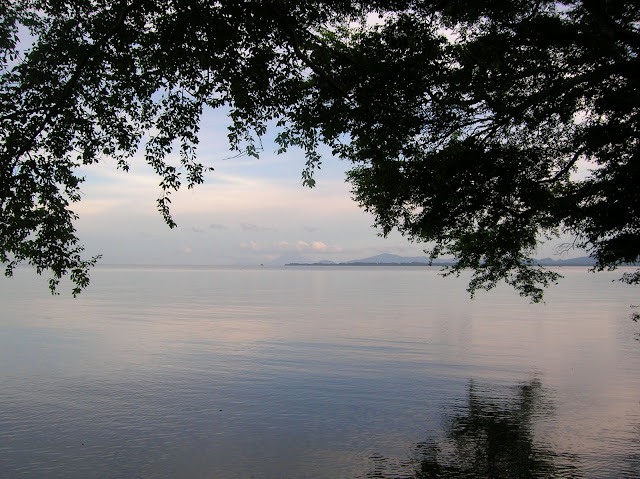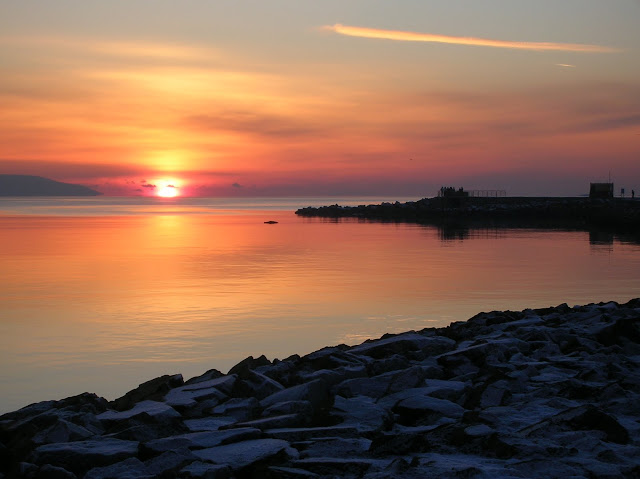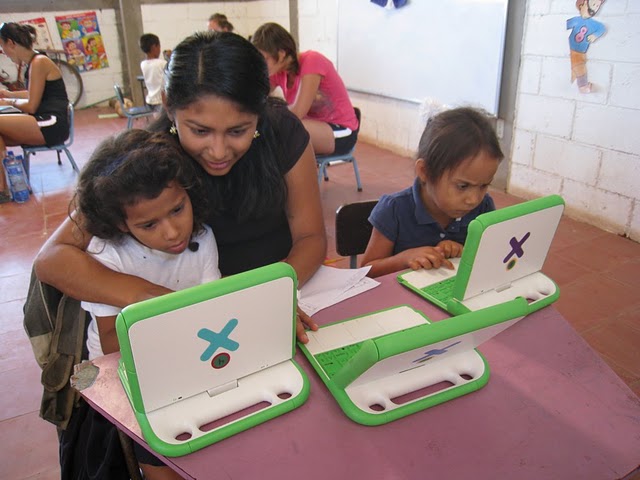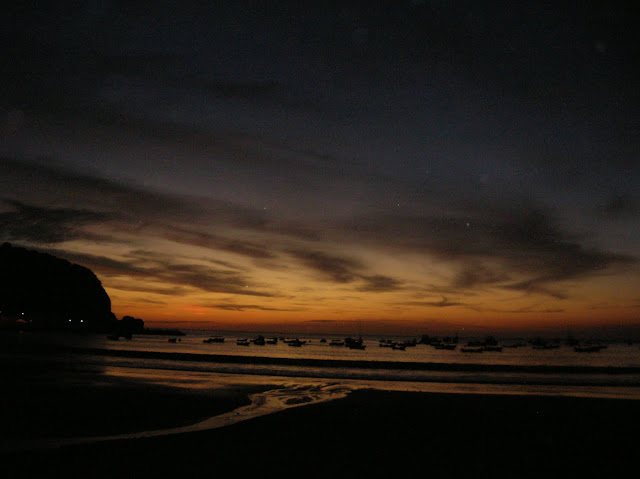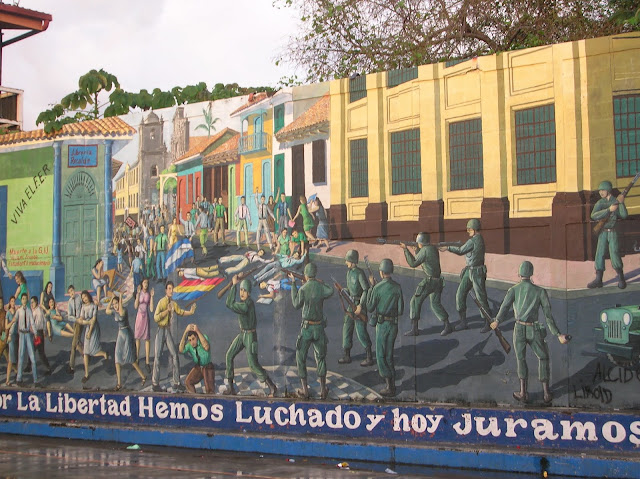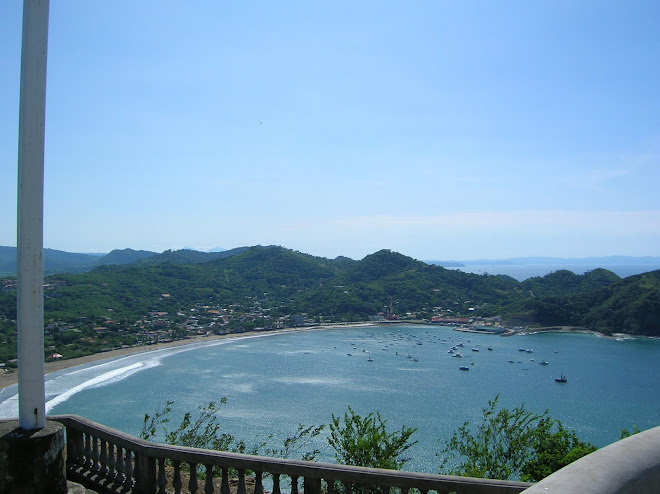It is kind of hard to live in a country as poor as Nicaragua without experiencing feelings of guilt from time to time.
Only Haiti, currently in the midst of a deadly cholera outbreak, is poorer among all the nations of the Americas. Here in Nicaragua, meanwhile, the local TV stations are dominated by news of an outbreak of leptosporosis, caused by rodents contaminating the water supply. So far, 16 people have died from a disease which could be easily avoided if they had the resources to deal with it.
Poverty is a fact of life, even in the most 'touristy' city in the country.
About 15 young volunteers live in the house next to my office and it is quite common to see impoverished local men rummage through their bags of waste on a week day. The young volunteers are by no means rich by European or North American standards, but some men think it's worthwhile to go through their left-overs in search of food or valuables.
Every day in town, you are bombarded by people selling cashew nuts, ceramics, clothes, CDs, or cigars. Even worse, loads of youngsters approach the foreigners on the Calzada, the pedestrianised street, looking for one dollar.
You harden yourself, you try not to encourage begging because it just makes them more dependant on the whims of foreigners. The 12 year old who wants money to buy glue could be the prostitute of tomorrow and there is a seedy underbelly to this place where North Americans enjoy extremely cheap holidays.
The locals think that all white people are rich, and relative to them we are. Not for your average Nicaraguan the chance to leave their country, even once in their life, for a holiday in a foreign land.
Already, I have grown used to people shouting at me, seeking a dollar, as I cycle around the streets.
Something as routine as visiting a family home to get a bike repaired can turn quite menacing, such as when a young man (also waiting for his bicycle to be fixed) demands money from you for looking at the Che Guevara tattoo on his arm. You try to laugh it off, show a sense of humour, but you know there is a hint of a threat in his demand.
It's the lack of hope that is most striking, the way so many people spend the entire day sitting outside their homes in groups, watching the world go by. The economy just doesn't work here and those who do find work often do so for just US$5 per day.
Just imagine what they think of people who can afford to spend the equivalent of two days' wages on a meal in a touristy restaurant.
Foreigners cannot do much to change a country that seems so broken, in which parents have no incentive to send their kids to school because they can't see any jobs or prospects for them on the horizon.
But, I guess, as a volunteer you just try to do a little bit to help out.
It's great to see some of our volunteers working one-on-one with the children over a number of months in the schools. They build up bonds and, more importantly, give the kids an interest in learning.
And it's magical to see the excitement in the schools when we go around with computers once a week. The children only get to use them for 40 minutes every seven days, but it's a wondrous experience for them.
Helping an organisation such as La Esperanza Granada is a richly rewarding experience, and has far more benefit than giving a dollar to a beggar on the street.
Quite possibly, it is the best thing I have done in my entire life.
When you see all the children who sniff glue in the heart of the city, you thank God for the handful of students who our volunteers might just encourage to stay on in school . . . or even to go on to University.
Our organisation has 11 'ayudantes', young people from dirt poor families who cannot afford to go to University. Thanks to our sponsors, they do so every weekend and they get paid US$80 per month for working for La Esperanza from Monday to Friday.
Every day, though, poverty is a fact of life and you rarely forget how well off you are compared to the locals.
For a white foreigner, it is not safe to walk home from the pub after 10 p.m. We stick out like sore thumbs because, relative to most Nicaraguans, we are really rich. My private Spanish language teacher only charges volunteer students US$3 per hour and considers that to be a decent wage.
That's not to say I have had any bad experiences in my five weeks so far in the country. I did up an old bicycle and have had no problems cycling home from O'Shea's Irish bar on a Wednesday or Saturday night.
But I've been told off by locals for daring to go home on my own at night, without taking a taxi.
Then again, as I've said in quite a few posts this year, too much of our lives is ruled (or ruined) by fear.
If I had listened to all the negative comments and predictions in Panama and Costa Rica, I would not even have come to Nicaragua.
Yet I have found that the poorest country I have visited in all of my gap year travels has also been the most enjoyable.
The Nicaraguans have a great sense of humour, a great joy for life, an ability to have fun and slag each other off which seems quite familiar to an Irish person.
These people are incredibly warm-hearted and, after all my doubts, I am so glad I came here and that I'm getting a chance to do something so rewarding.
Poverty might push people towards crime, as it is simply unfair to put temptation in the way of someone who struggles to put food on the table every day.
But I've found that, contrary to all the negative talk in neighbouring countries, this is actually the safest country in Central America.
Now if only someone, somewhere, could give them some hope in terms of the creation of jobs, so that they would not all have to dream about emigrating to Costa Rica or the USA, countries in which many of them are treated as second class citizens.
In a way, this country is like Ireland in the 1950s, when our parents' generation grew up without shoes to go to school in overcrowded rural homes.
Hopefully, the Nicas, too, can taste some of the radical change which allowed Ireland to become rich, if only for the briefest of times.
Because it must be very, very hard to live your whole life without some hope for the future, some hope of a job or a better life.
Saturday, October 23, 2010
Sunday, October 17, 2010
Beware of obnoxious Americans
Beware of loud Americans with obnoxious opinions, as I learned again tonight when I was approached by a seemingly friendly New Yorker (while having my dinner in an outdoor restaurant) who just would not stop talking.
After regaling me with some interesting tales about life on the east coast of the country, where the locals speak a curious language (Moskito) which has been compared to Pidgin English, the internal alarm bells rang when he switched to politics.
Before I knew it, this tall, geeky type was explaining to me 'why' the Americans had sent the 'Contras' into Nicaragua in the late 1980s. I couldn't believe the arrogance, this assumption that the good old US of A has a right to mess around with and abuse every little country in its own back yard, and I nearly exploded when he got on to calling the current President of Nicaragua, Daniel Ortega, a 'war criminal'.
Unfortunately, due to a busted foot, I was unable to kick the man. But when I countered that good old Ronnie Raegan and George W. Bush could also be perceived as war criminals, he told me this was "only an opinion". Only an opinion, after I had listened to his tripe for half an hour? I could sense the pointlessness of the conversation and got out of there.
I'm no apologist for Nicaragua's current leader after a month in the country, but I am full of admiration for a tiny country (with a population similar to Ireland's) which staged a revolution to topple an awful, right wing dictator (Somosa) in the late 1970s, and dared to stand up to the might of Uncle Sam and its rotten Contras.
There has hardly ever been a 'war' in which atrocities were not committed on both sides ... for 'Bloody Sunday', internment, or Maggie Thatcher's response to the hunger strikes, which gave the IRA huge legitimacy in the eyes of thousands of Irish people for years, we had 'Omagh' and 'Enniskillen'.
But it shocks me the way some Americans go about their daily lives in Nicaragua, full of their own self-importance and not a bit conscious of the fact that fate has been kind to them (economically, if not mentally!) by virtue of where they were born.
It's low season in Granada, so it doesn't take long to get to know some of the expats if you are into drinking along La Calzada, the only pedestrian zone in the entire country.
To generalise, most of them are male, in their 50s and 60s, divorced and retired, and enjoying life here because their dollar will allow them to buy the company of pretty girls in their 20s.
That's all fair enough, I've seen their likes in Thailand (mostly Brits and Germans), even if it is a sad reflection on the entire world that people feel to compelled to sell their bodies in order to get out of extreme poverty.
But what sickens me is the way these North Americans sit around the same bars every day, drinking Flor de Cama rum. They show nothing but contempt for the street vendors who approach them selling ceramics, cigarettes, cashew nuts, or a countless variety of trinkets.
These 'gringos' don't speak Spanish, so they dismiss the local traders, loudly, in English; and then complain among themselves about how annoying the locals are.
This is in a country where a huge per centage of the population struggle to put food on the table every day, where they dream of doing crap jobs in Costa Rica or the USA.
Daniel Ortega is no Saint, I have learned, just as my first (and only) trip to Cuba ruined my illusions about another revolution 11 years ago.
But the poverty in both countries has only been exacerbated by the terrible foreign policy decisions of the Americas' only superpower down through the decades.
Just imagine, if instead of arming the Contras to the teeth, what this country would be like if the USA invested in its education and its infrastructre.
Nicaragua needs hope and investment, as there is huge potential in this youthful country which has so much poverty and unemployment.
What it doesn't need is more and more North Americans, who only come here because their dollar can go further in the poorest country in the Americas. I don't care if they are drinking themselves to death on Flor de Cana, as many of them are doing each day, but it annoys me as a fellow 'gringo' (in the eyes of the locals) to see them insult the Nicos so regularly while they plonk their fat asses outside a handful of pubs.
There but for the grace of God, any of us could have been born a Nicaraguan. And hundreds of dollars will buy you a prostitute in any impoverished country, no matter how fat, obnoxious, or ugly you are.
Sadly, the New Yorker in his 60s still hasn't come to that realisation, as he abuses the locals in a language they don't understand. So it's probably a good job he is too dumb or lazy to learn Spanish!
I don't mean to put down all North Americans, because I have also met some incredible Americans and Canadians during my time here, many of whom have given up their time to help out those in need through charities and NGOs.
But Nicaraguans have a distrust of loud North Americans ever since a man called William Walker came down here from the USA, staged a coup, and took over the country for a brief time in the 1850s. From what I've seen here so far, they are dead right!
After regaling me with some interesting tales about life on the east coast of the country, where the locals speak a curious language (Moskito) which has been compared to Pidgin English, the internal alarm bells rang when he switched to politics.
Before I knew it, this tall, geeky type was explaining to me 'why' the Americans had sent the 'Contras' into Nicaragua in the late 1980s. I couldn't believe the arrogance, this assumption that the good old US of A has a right to mess around with and abuse every little country in its own back yard, and I nearly exploded when he got on to calling the current President of Nicaragua, Daniel Ortega, a 'war criminal'.
Unfortunately, due to a busted foot, I was unable to kick the man. But when I countered that good old Ronnie Raegan and George W. Bush could also be perceived as war criminals, he told me this was "only an opinion". Only an opinion, after I had listened to his tripe for half an hour? I could sense the pointlessness of the conversation and got out of there.
I'm no apologist for Nicaragua's current leader after a month in the country, but I am full of admiration for a tiny country (with a population similar to Ireland's) which staged a revolution to topple an awful, right wing dictator (Somosa) in the late 1970s, and dared to stand up to the might of Uncle Sam and its rotten Contras.
There has hardly ever been a 'war' in which atrocities were not committed on both sides ... for 'Bloody Sunday', internment, or Maggie Thatcher's response to the hunger strikes, which gave the IRA huge legitimacy in the eyes of thousands of Irish people for years, we had 'Omagh' and 'Enniskillen'.
But it shocks me the way some Americans go about their daily lives in Nicaragua, full of their own self-importance and not a bit conscious of the fact that fate has been kind to them (economically, if not mentally!) by virtue of where they were born.
It's low season in Granada, so it doesn't take long to get to know some of the expats if you are into drinking along La Calzada, the only pedestrian zone in the entire country.
To generalise, most of them are male, in their 50s and 60s, divorced and retired, and enjoying life here because their dollar will allow them to buy the company of pretty girls in their 20s.
That's all fair enough, I've seen their likes in Thailand (mostly Brits and Germans), even if it is a sad reflection on the entire world that people feel to compelled to sell their bodies in order to get out of extreme poverty.
But what sickens me is the way these North Americans sit around the same bars every day, drinking Flor de Cama rum. They show nothing but contempt for the street vendors who approach them selling ceramics, cigarettes, cashew nuts, or a countless variety of trinkets.
These 'gringos' don't speak Spanish, so they dismiss the local traders, loudly, in English; and then complain among themselves about how annoying the locals are.
This is in a country where a huge per centage of the population struggle to put food on the table every day, where they dream of doing crap jobs in Costa Rica or the USA.
Daniel Ortega is no Saint, I have learned, just as my first (and only) trip to Cuba ruined my illusions about another revolution 11 years ago.
But the poverty in both countries has only been exacerbated by the terrible foreign policy decisions of the Americas' only superpower down through the decades.
Just imagine, if instead of arming the Contras to the teeth, what this country would be like if the USA invested in its education and its infrastructre.
Nicaragua needs hope and investment, as there is huge potential in this youthful country which has so much poverty and unemployment.
What it doesn't need is more and more North Americans, who only come here because their dollar can go further in the poorest country in the Americas. I don't care if they are drinking themselves to death on Flor de Cana, as many of them are doing each day, but it annoys me as a fellow 'gringo' (in the eyes of the locals) to see them insult the Nicos so regularly while they plonk their fat asses outside a handful of pubs.
There but for the grace of God, any of us could have been born a Nicaraguan. And hundreds of dollars will buy you a prostitute in any impoverished country, no matter how fat, obnoxious, or ugly you are.
Sadly, the New Yorker in his 60s still hasn't come to that realisation, as he abuses the locals in a language they don't understand. So it's probably a good job he is too dumb or lazy to learn Spanish!
I don't mean to put down all North Americans, because I have also met some incredible Americans and Canadians during my time here, many of whom have given up their time to help out those in need through charities and NGOs.
But Nicaraguans have a distrust of loud North Americans ever since a man called William Walker came down here from the USA, staged a coup, and took over the country for a brief time in the 1850s. From what I've seen here so far, they are dead right!
Thursday, October 7, 2010
Settling into Nicaragua
Life here in Nicaragua is certainly different to anywhere else I've lived in. The reality of poverty faces you daily as you negotiate the picturesque city of Granada, and I don't need reminding that this is the most 'touristic' city of the country so I haven't even seen the real Nicaragua yet.
People approach you looking for one dollar, and no matter how you deal with them the reality is that you are rich compared to them.
In Nicaragua, there is a desperate need for hope. The organisation I am working for, La Esperanza Granada, send a team of 30 volunteers out to help provide education in crowded rural schools and, once you get out there, far off the beaten track, the living conditions are a real eye-opener.
Most tourists never see the primitive tin huts our volunteers visit after school each day.
But, after just over two and a half weeks in the country so far, the reality of life in Nicaragua has exceeded all my expectations.
In Panama and Costa Rica, I was warned that I would be robbed or assaulted here, and a big Irishman with blond hair and blue eyes does stick out in this impoverished country. But so far, so good ... I actually feel safer here at night than in Costa Rica.
That's not to say there are no problems, because Managua is reputed to be a nightmare of a city for foreigners and there are parts of Granada in which it is just not safe to walk alone after dark.
There is a small expat community here, mostly Americans, many of whom make little or no effort to integrate. They drink in the pubs along the Calzada, the beautiful main pedestrian street which links the huge lake with the city centre, starting early and finishing early.
Used to walking home from the pub in Galway, Thailand, or Spain, the idea that I need to take a taxi as early as 10 p.m. at night takes a bit of getting used to. But once the streets get quiet there is no other option, and foreigners definitely cannot walk down the darker side streets in which the poverty is more acute.
I've seen huge families living in squalid tin huts, been called a 'Gringo' more than a few times by bored young men in dodgy areas, and watched the mad street life where 70 year old Americans walk around with 17-year old 'girlfriends'.
I didn't think I'd encounter the kind of sex tourism which has given parts of Thailand such a reputation all over the world, but I guess there's poverty everywhere and the disparity manifests itself in different places. For all the Germans and Brits in Pataya or Patong, there are plenty of Americans here.
Who am I to tell the 65-year old hard drinking divorced American that the 25-year old model under his arm is only after him for his money? He knows that anyway, and he doesn't care, and he will probably be with someone else tomorrow night anyway.
It's an intriguing place, a mixture of loud obnoxious American bars and decent local spots where I can even catch a Barcelona or Liverpool game on a weekend morning.
On my first weekend, I even caught a live heavy rock band in Kelly's which, despite the name, is locally owned.
There is one Irish bar, owned by Tommie from Dublin, and it's a real social hub for the European expats. O'Shea's is where we host our pub quiz every Wednesday night. There are three other Irish people in town that I know of, and at this stage I have met all three!
And as for the work? I don't think I have ever worked for nothing before, but I am also pretty sure that I have never had such a rewarding job.
Seeing the joy which playing on a computer or interacting with a foreign volunteer brings to a child has reminded me of the value of the simple things in life.
Right now, life in Nicaragua is incredible.
I'm not getting to scuba dive in pristine waters, or drink until dawn in a beach bar, and I haven't fallen in love with a Latin supermodel.
But I've fallen back in love with life and the world and I am full of admiration for all the young volunteers in their early 20s, who have come here just to try to provide a slightly better life to impoverished children.
When I was their age, all I wanted to do was party all the time and the idea of volunteering for months so far from home never crossed my mind. That was a self-destructive period of my life and I think I am much better prepared for this experience now.
Yesterday, I edited a video about our volunteer programme after bringing a sponsor from the US and a representative of a volunteer website in the UK around to a number of our projects.
And today, under the blistering sun, I walked into work with a relish at 9 a.m. I can't remember feeling like that at home for quite a while. I am still only scratching the surface of this place, but I am meeting lovely, genuine people who only want a chance in life everyday.
Already, I feel really content here, and I just don't want to think about going home at the end of the year.
And to think that for weeks, especially when I went home, I had built myself up into a frenzy of fear over the thought of coming to Nicaragua.
Sometimes the reality can be totally different from our fears.
People approach you looking for one dollar, and no matter how you deal with them the reality is that you are rich compared to them.
In Nicaragua, there is a desperate need for hope. The organisation I am working for, La Esperanza Granada, send a team of 30 volunteers out to help provide education in crowded rural schools and, once you get out there, far off the beaten track, the living conditions are a real eye-opener.
Most tourists never see the primitive tin huts our volunteers visit after school each day.
But, after just over two and a half weeks in the country so far, the reality of life in Nicaragua has exceeded all my expectations.
In Panama and Costa Rica, I was warned that I would be robbed or assaulted here, and a big Irishman with blond hair and blue eyes does stick out in this impoverished country. But so far, so good ... I actually feel safer here at night than in Costa Rica.
That's not to say there are no problems, because Managua is reputed to be a nightmare of a city for foreigners and there are parts of Granada in which it is just not safe to walk alone after dark.
There is a small expat community here, mostly Americans, many of whom make little or no effort to integrate. They drink in the pubs along the Calzada, the beautiful main pedestrian street which links the huge lake with the city centre, starting early and finishing early.
Used to walking home from the pub in Galway, Thailand, or Spain, the idea that I need to take a taxi as early as 10 p.m. at night takes a bit of getting used to. But once the streets get quiet there is no other option, and foreigners definitely cannot walk down the darker side streets in which the poverty is more acute.
I've seen huge families living in squalid tin huts, been called a 'Gringo' more than a few times by bored young men in dodgy areas, and watched the mad street life where 70 year old Americans walk around with 17-year old 'girlfriends'.
I didn't think I'd encounter the kind of sex tourism which has given parts of Thailand such a reputation all over the world, but I guess there's poverty everywhere and the disparity manifests itself in different places. For all the Germans and Brits in Pataya or Patong, there are plenty of Americans here.
Who am I to tell the 65-year old hard drinking divorced American that the 25-year old model under his arm is only after him for his money? He knows that anyway, and he doesn't care, and he will probably be with someone else tomorrow night anyway.
It's an intriguing place, a mixture of loud obnoxious American bars and decent local spots where I can even catch a Barcelona or Liverpool game on a weekend morning.
On my first weekend, I even caught a live heavy rock band in Kelly's which, despite the name, is locally owned.
There is one Irish bar, owned by Tommie from Dublin, and it's a real social hub for the European expats. O'Shea's is where we host our pub quiz every Wednesday night. There are three other Irish people in town that I know of, and at this stage I have met all three!
And as for the work? I don't think I have ever worked for nothing before, but I am also pretty sure that I have never had such a rewarding job.
Seeing the joy which playing on a computer or interacting with a foreign volunteer brings to a child has reminded me of the value of the simple things in life.
Right now, life in Nicaragua is incredible.
I'm not getting to scuba dive in pristine waters, or drink until dawn in a beach bar, and I haven't fallen in love with a Latin supermodel.
But I've fallen back in love with life and the world and I am full of admiration for all the young volunteers in their early 20s, who have come here just to try to provide a slightly better life to impoverished children.
When I was their age, all I wanted to do was party all the time and the idea of volunteering for months so far from home never crossed my mind. That was a self-destructive period of my life and I think I am much better prepared for this experience now.
Yesterday, I edited a video about our volunteer programme after bringing a sponsor from the US and a representative of a volunteer website in the UK around to a number of our projects.
And today, under the blistering sun, I walked into work with a relish at 9 a.m. I can't remember feeling like that at home for quite a while. I am still only scratching the surface of this place, but I am meeting lovely, genuine people who only want a chance in life everyday.
Already, I feel really content here, and I just don't want to think about going home at the end of the year.
And to think that for weeks, especially when I went home, I had built myself up into a frenzy of fear over the thought of coming to Nicaragua.
Sometimes the reality can be totally different from our fears.
Subscribe to:
Posts (Atom)
